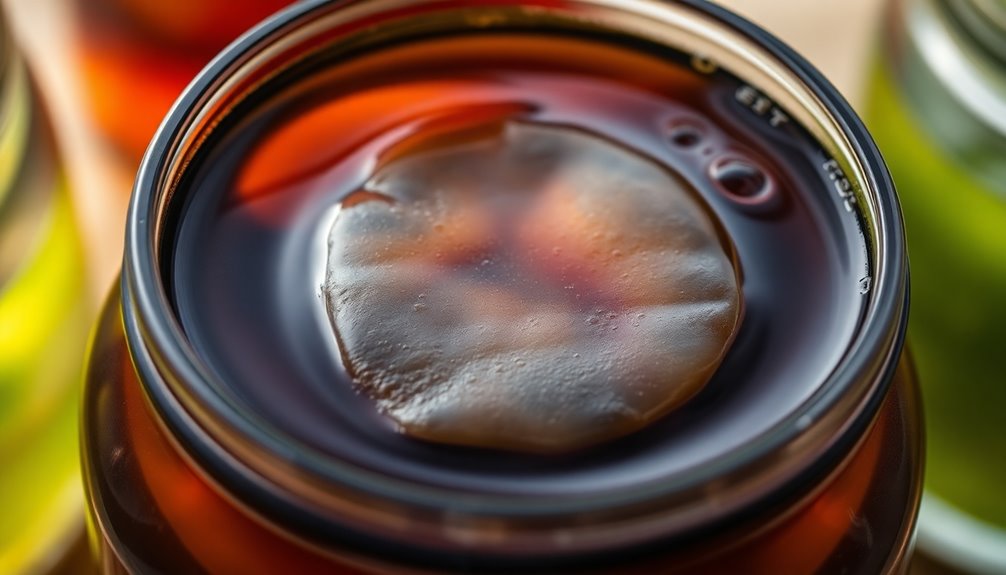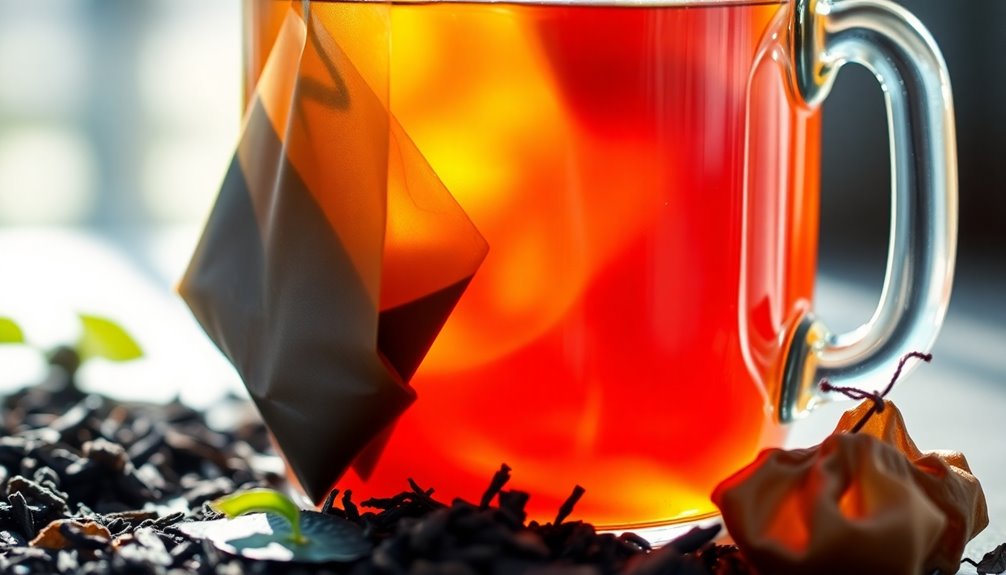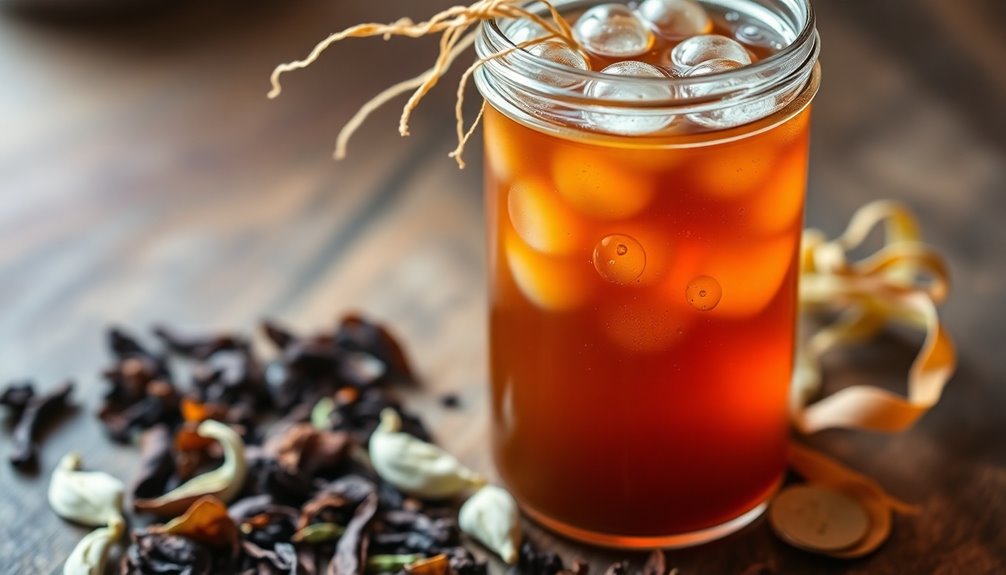Black tea's the better option for brewing kombucha because of its bold flavor and rich nutrient profile. It creates a more stable and forgiving fermentation environment, which means you get consistent results every time. The higher tannin content not only enhances the taste but also acts as a natural preservative, extending the shelf life of your kombucha. Plus, black tea fosters better microbial interactions, leading to a more vibrant final product. With its robust flavor, black tea also pairs well with various fruits and herbs for creative recipes. Stick around, and you'll discover even more benefits of choosing black tea!
Key Takeaways
- Black tea provides a robust nutrient profile that enhances microbial growth, ensuring a more stable fermentation process compared to green tea.
- The full oxidation of black tea creates a complex flavor profile, offering a bolder taste that appeals to a wider audience.
- Higher tannin content in black tea acts as a natural preservative, extending kombucha's shelf life and boosting antioxidant activity.
- Black tea fosters consistent brewing outcomes, minimizing unexpected sourness or bitterness often associated with green tea fermentation.
- Historical use of black tea in kombucha production, particularly in regions like Russia, supports its reliability and tradition over green tea.
Distinct Flavor Profiles

When it comes to brewing kombucha, black tea stands out with its distinct flavor profile. Its full oxidation during processing gives it a stronger, bolder taste that many of you might prefer.
The bitterness of black tea adds complexity to your kombucha, allowing the flavors to really shine, especially when you add fruits or herbs. You'll notice a more robust mouthfeel, enhancing your overall sensory experience.
The tannins in black tea balance out the sweet and sour notes, creating a delightful harmony. Plus, kombucha made with black tea usually has higher antioxidant capacity compared to green tea, making it not just tasty but also a healthier choice.
Fermentation Dynamics

While many factors influence the fermentation of kombucha, black tea offers unique dynamics that enhance its development.
Here's what you should know about the fermentation dynamics when using black tea:
- Black tea's full oxidation creates a nutrient-rich environment, supporting robust microbial growth.
- The higher concentration of phenolic compounds boosts antioxidant capacity and flavor complexity.
- Tannins in black tea provide essential nutrients, stabilizing the fermentation process.
These characteristics contribute to a more forgiving fermentation temperature and duration, allowing you to experiment with brewing conditions.
The specific compounds in black tea, like theaflavins and thearubigins, foster a diverse microbial community within your SCOBY, ensuring a successful and flavorful kombucha. Additionally, the presence of antioxidants in chia seeds may enhance the overall health benefits of your kombucha when consumed together.
Nutrient Composition

When you choose black tea for your kombucha, you're not just selecting a flavor; you're also impacting its nutrient composition.
The antioxidant levels in black tea can greatly enhance the health benefits of your brew, while its unique flavor profile sets it apart from other teas.
Plus, the microbial activity influenced by these nutrients plays an essential role in fermentation, leading to a more vibrant and complex final product. Additionally, black tea is known for its antioxidants that help combat oxidative stress, further enriching your kombucha's health benefits.
Antioxidant Levels Comparison
Although both black tea and green tea kombucha offer health benefits, black tea kombucha stands out due to its superior antioxidant levels.
When you compare the antioxidant levels, you'll notice several key differences:
- Black tea kombucha has a greater diversity of phenolic compounds.
- It contains higher levels of flavonoids, enhancing its antioxidant effects.
- The polyphenolic content in black tea kombucha is more abundant.
These factors contribute to black tea's higher antioxidant capacity, making it potentially more beneficial for your health.
The fermentation process also increases the availability of antioxidants, ensuring that you get the most out of your kombucha.
If you're looking for a drink that maximizes antioxidant benefits, black tea kombucha is the better choice!
Flavor Profile Differences
How does the flavor profile of black tea kombucha differ from that of green tea kombucha?
Black teas undergo full oxidation, resulting in a bolder, more robust flavor that contrasts with the milder, herbaceous notes of green tea. When you brew kombucha with black tea, the fermentation enhances its pleasant bitterness, balancing well with any added fruits or flavors.
You'll also notice a stronger tannin presence in black tea kombucha, contributing to a unique mouthfeel and overall taste experience. Plus, the higher caffeine content of black tea, ranging from 40-70 mg per 8 oz, offers a stimulating effect, appealing to those looking for an energizing beverage.
Microbial Activity Influence
The nutrient composition of black tea markedly influences microbial activity during kombucha fermentation. This tea's rich profile enhances the growth of the yeast and bacteria in your SCOBY, optimizing the fermentation process.
Here's how black tea stands out:
- Higher tannin content boosts yeast and bacterial activity.
- Rich in polyphenols and amino acids promotes robust fermentation.
- Increased sugar availability from oxidation supports vigorous yeast growth.
These factors contribute to a healthier SCOBY and a more efficient brewing experience.
Additionally, the specific flavonoids found in black tea, like theaflavins and thearubigins, enhance metabolic activity, resulting in kombucha with higher antioxidant capacity.
Tannin Content Benefits

When you choose black tea for your kombucha, you're not just enhancing the flavor; you're also benefiting from its higher tannin content.
The increased tannin content in black tea adds a depth of flavor and a pleasant astringency, resulting in a more balanced mouthfeel for your kombucha. This richness can make your final product more enjoyable.
Additionally, tannins act as natural antioxidants, helping to preserve your kombucha and potentially extending its shelf life. The fermentation process with black tea releases polyphenols, which are abundant due to the higher tannin content, promoting antioxidant activity.
Plus, research indicates that this higher tannin concentration can create a more robust fermentation environment, fostering better growth and activity for your SCOBY during brewing.
Microbial Interactions

When you brew kombucha with black tea, you set the stage for a fascinating synergy between yeast and bacteria.
The nutrient profile of black tea not only boosts their growth but also shapes the unique flavor development in your brew.
This interaction enhances both the taste and health benefits, making your kombucha a standout choice.
Yeast and Bacteria Synergy
While brewing kombucha, you'll notice how the synergy between yeast and bacteria plays an essential role in the fermentation process.
Using black tea enhances this interaction, leading to a more effective kombucha SCOBY. Here are some key benefits:
- Nutrient-Rich: Black tea's higher oxidation level supports the growth of yeast and bacteria.
- Enhanced Metabolism: Polyphenols like theaflavins boost the metabolic activity of Acetobacter and yeast.
- Flavor and Effervescence: The yeast species Zygosaccharomyces thrives in black tea, improving flavor and carbonation.
This dynamic relationship not only enhances the fermentation efficiency but also contributes to a balanced, flavorful final product. Additionally, the probiotic benefits of kombucha are amplified when using black tea due to its nutrient profile.
Nutrient Availability Comparison
Although various teas can be used for brewing kombucha, the nutrient availability in black tea stands out markedly due to its unique composition.
The full oxidation process of black tea enriches its nutrient profile, particularly in polyphenols and flavonoids, which positively impact microbial interactions during fermentation. Its higher tannin content promotes the growth of beneficial bacteria, enhancing the fermentation process and resulting in a more robust SCOBY.
Additionally, black tea creates a favorable environment for Zygosaccharomyces yeast, essential for converting sugars into alcohol and carbon dioxide. The diverse array of phenolic compounds in black tea supports a thriving microbial ecosystem, ultimately influencing the health and quality of your kombucha.
This nutrient-rich environment fosters vigorous fermentation, leading to a consistent, desirable end product.
Flavor Profile Development
As you brew kombucha with black tea, the unique microbial interactions between the tea's compounds and the SCOBY can greatly enhance the flavor profile. The full oxidation of black tea enriches its nutrient content, creating a robust foundation for fermentation.
Here are some ways black tea elevates your kombucha's flavor:
- Complexity: The higher tannin content adds depth and richness.
- Bitterness: A pleasant bitterness complements various flavor additions.
- Balance: The diverse microorganisms lead to a more pronounced and balanced taste.
Ultimately, black tea not only offers a richer flavor but also contributes to a higher antioxidant capacity, enhancing both taste and health benefits in your kombucha.
Enjoy the intricate flavors that black tea brings to your brew!
Production Consistency

Guaranteeing production consistency in kombucha brewing is vital for achieving a reliable flavor and fermentation outcome.
When you use black tea, you're taking advantage of its higher tannin content, which fosters a stable environment for the yeast and bacteria essential for fermentation. This fully oxidized tea also contributes to a stable flavor profile, minimizing the chance of unexpected sourness or bitterness.
The robust nutrient composition of black tea, rich in polyphenols and flavonoids, enhances microbial activity during fermentation, leading to more dependable results. Additionally, the presence of antioxidants present in black tea may further support the health of the fermentation culture.
In contrast, green tea can introduce inconsistencies due to its quality variability and temperature sensitivity.
With a long history in kombucha production, black tea offers established practices that help guarantee consistent flavor and fermentation outcomes.
Popularity and Preferences

When it comes to kombucha, black tea reigns supreme in popularity, thanks to its robust flavor profile that enhances the final beverage's complexity. Many consumers are drawn to the slightly bitter and bold taste of black tea kombucha, which pairs beautifully with various flavorings.
Here are some reasons why black tea is the preferred choice:
- It creates a more complex and satisfying taste.
- Black tea kombucha often boasts higher antioxidant levels, appealing to health-conscious drinkers.
- The fermentation process produces a stable SCOBY, ensuring consistent brewing quality.
Historically associated with kombucha, especially in Russia, black tea continues to dominate the market, thanks to its versatility and the unique character it brings to the drink.
Versatility in Recipes

Black tea's robust flavor not only makes it a popular choice but also lends itself to an impressive range of recipes for kombucha enthusiasts.
Its complex taste allows you to experiment with various fruits, spices, and herbs, creating bold and unique kombucha variations. The higher tannin content in black tea enhances depth, giving your brews a satisfying balance of sweetness and acidity.
This versatility means you can maintain flavor integrity during fermentation, ensuring consistent results across batches. Whether you prefer classic flavors or adventurous combinations, black tea empowers you to elevate your kombucha recipes, making each brew a delightful experience. Additionally, incorporating tropical fruits into your kombucha can further enhance its refreshing qualities and nutritional value.
Frequently Asked Questions
Is Black Tea or Green Tea Better for Kombucha?
When you're deciding between black tea and green tea for kombucha, black tea often stands out.
It offers a richer nutrient profile and a more robust environment for the SCOBY, leading to a more complex flavor. You'll find that black tea tends to ferment more reliably, making it a great choice if you're a beginner.
Plus, its higher antioxidant levels can provide additional health benefits, enhancing your kombucha experience overall. These antioxidants play a crucial role in combating oxidative stress, which can lead to improved well-being and vitality. To complement this healthy lifestyle, consider investing in the delonghi la specialist arte performance for your brewing needs, ensuring that you create the perfect cup of coffee to enjoy alongside your refreshing kombucha. Together, these choices can elevate both your hydration and caffeination rituals.
Why Is Black Tea Better Than Green Tea?
Imagine diving into a rich, velvety sea of flavor—this is what black tea offers you.
It's fully oxidized, which gives it a treasure trove of nutrients, creating a vibrant fermentation process. You'll find that black tea's robust profile tickles your taste buds like a bold symphony.
Plus, it's more forgiving during fermentation, making your brewing journey smoother.
What Kind of Black Tea for SCOBY?
When choosing black tea for your SCOBY, you'll want to contemplate varieties like Darjeeling, Assam, or Ceylon. Each offers unique flavors that can enhance your kombucha.
Opt for high-quality, organic options to avoid harmful additives. The tannin content in black tea boosts fermentation, resulting in a robust brew.
Experiment with different types to discover which flavor profiles you enjoy most, while ensuring a healthy environment for your SCOBY to thrive.
Can I Use Green Tea for SCOBY?
Yes, you can use green tea for your SCOBY, but you'll need to keep an eye on it.
Green tea tends to produce a milder flavor and may lead to less robust fermentation compared to black tea.
If you prefer a bolder taste, you might find green tea less appealing.
Just remember, the fermentation process might require more careful monitoring to achieve the flavor and acidity levels you desire.
Conclusion
In the world of kombucha, black tea shines with its bold flavor and robust fermentation, while green tea offers a delicate touch. You'll find that black tea's richer nutrient composition and higher tannin content not only enhance the brew but also promote consistency in production. While green tea may appeal to the health-conscious, black tea captures the heart of kombucha enthusiasts. So, if you're looking for a vibrant and reliable brew, black tea's your best bet!










